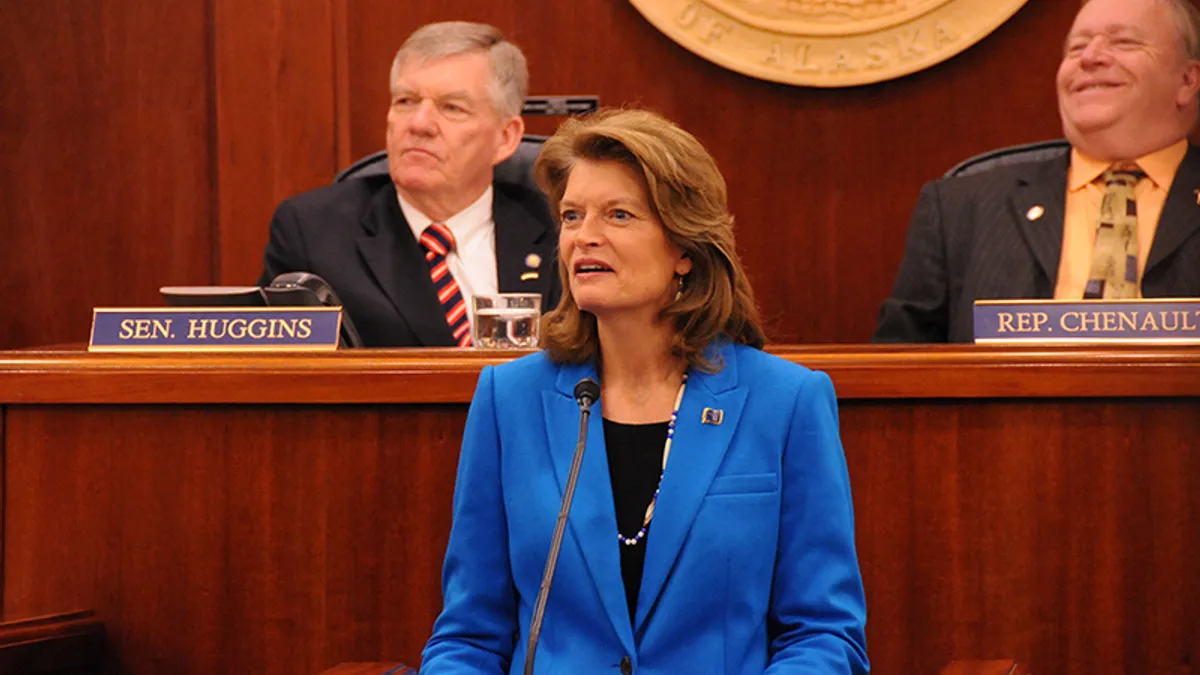Dive Brief:
- The U.S. Senate on Wednesday morning passed S. 2012, the Energy Policy Modernization Act of 2016, in a 85-12 vote. It is the first broad energy legislation to emerge from the chamber since 2007.
- While skirting the most controversial issues the bill hits a number of bipartisan energy priorities, including enhancing federal energy efficiency programs, easing permitting for infrastructure projects and funding research and development.
- After weeks of delay due to disagreements over funding for the Flint water crisis and offshore drilling, senators on Tuesday considered a raft of amendments to the bill to prepare it for a final vote. It will now need to be reconciled with a GOP-backed energy bill passed in the House last year. Unlike S. 2012, the House bill faces a veto threat from President Obama.
Dive Insight:
Immediately following the vote on her signature energy policy bill, Sen. Lisa Murkowski (R-AK), chair of the Energy and Natural Resources Committee, told her colleagues that while she had "hundreds of pages" of energy policy she would like to see passed, she was pleased with the bipartisan work done on her bill.
“I have framed my energy policy into three simple words ... energy is good," she said on the Senate floor. "I think that’s what we have concluded with passage of the Energy Policy Modernization Act of 2016.”
Passage of the bill came swiftly after weeks of delays related to amendments on offshore drilling and the Flint water crisis. When Michigan Democrats attempted to attach funding for Flint, Sen. Mike Lee (R-UT) put a hold on the bill, blocking any progress until the Michigan delegation dropped their demand it be included last week.
Sen. Bill Nelson (D-FL) also ended his hold on the bill last week after a provision that could have expanded offshore drilling to his state was dropped from consideration, setting the package up for its last votes on amendments and approval.
The bill, Argus Media reports, was somewhat overshadowed by a $1.1 trillion spending bill passed late last year that repealed restrictions on crude exports and extended tax incentives for wind and solar energy.
Even so, Murkowski's measure does make some changes to federal policies around energy infrastructure, permitting and efficiency, such as boosting conservation standards for federal buildings. It also funds new research and development into energy storage, marine and hydrokinetic energy, and heat rate improvements and carbon capture technology for coal plants.
Following the vote, the Edison Electric Institute, the trade group for investor-owned utilities, praised the measure.
“This legislation will improve the federal permitting process for critical energy infrastructure, including natural gas pipelines, electric transmission facilities, and hydro power projects," the group wrote in a statement. "It will also repeal a ban on fossil fuel generated energy at federal buildings created by Section 433 of the 2007 energy bill, replacing that section with widely supported fuel-neutral energy efficiency policies for new and renovated federal buildings."
Energy efficiency advocates offered a similar reaction, highlighting the inclusion of the SAVE Act, which would allow federal mortgage backers to consider potential efficiency upgrades when assessing a homeowner's ability to make payments.
"The SAVE Act will improve the accuracy of mortgage underwriting used by federal mortgage agencies by including a property’s energy use as a factor in determining the value and affordability of a home, to facilitate energy efficiency," the Alliance to Save Energy (ASE), an efficiency group, wrote in a statement.
While Murkowski's bill enjoyed broad bipartisan support in the Senate, it now must be reconciled with one passed by House lawmakers in December. The House bill garnered support from Democratic lawmakers early in the process, but they walked away after provisions were introduced to allow crude exports and alter federal regulations to ease siting of oil and gas projects like the Keystone XL pipeline.
On Tuesday, Murkowski told E&E Daily she hopes to start the reconciliation process with the House as soon as possible and finish before the August recess to avoid the issue being pushed to a lame-duck congressional session after the November elections.
"I really really, really do not want to be in that situation," she said. "I'm going to be pushing to try to move this as soon as possible. I'd like to see it done and out before we break at summer."














